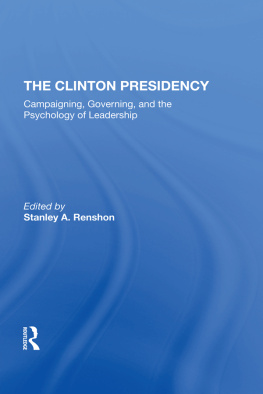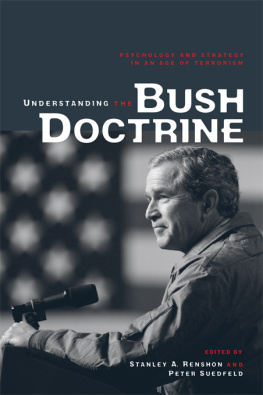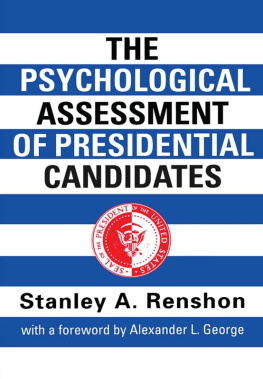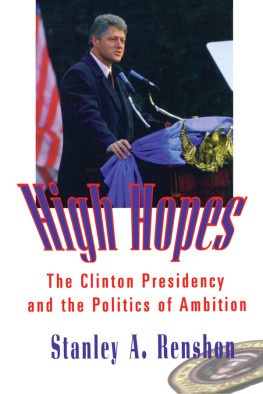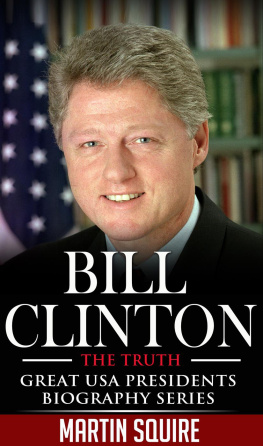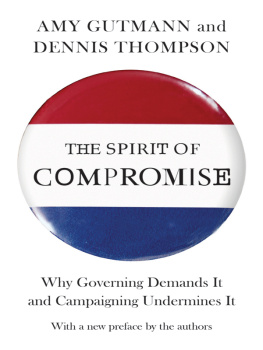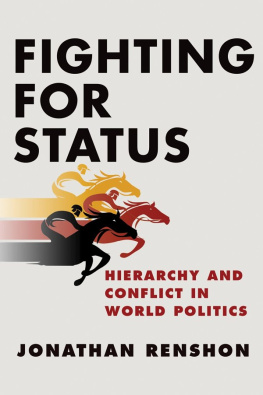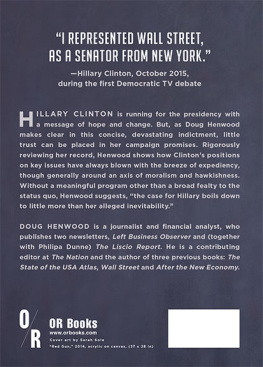First published 1995 by Westview Press
Published 2019 by Routledge
52 Vanderbilt Avenue, New York, NY 10017
2 Park Square, Milton Park, Abingdon, Oxon OX14 4RN
Routledge is an imprint of the Taylor & Francis Group, an informa business
Copyright 1995 Taylor & Francis
All rights reserved. No part of this book may be reprinted or reproduced or utilised in any form or by any electronic, mechanical, or other means, now known or hereafter invented, including photocopying and recording, or in any information storage or retrieval system, without permission in writing from the publishers.
Notice:
Product or corporate names may be trademarks or registered trademarks, and are used only for identification and explanation without intent to infringe.
Library of Congress Cataloging-in-Publication Data
Renshon, Stanley Allen.
The Clinton presidency : campaigning, governing, and the
psychology ofleadership / Stanley A. Renshon.
p. cm.
Includes bibliographical references and index.
1. United StatesPolitics and government1993- Psychological
aspects. 2. PresidentsUnited StatesElection1992
Psychological aspects. 3. Clinton, Bill, 1946- . I. Title.
E885.R46 1995
973.929019dc20
94-27952
CIP
ISBN 13: 978-0-367-29090-0 (hbk)
Debate on public issues and candidates stands on them have traditionally represented the bulk of knowledge sought about presidential candidates. In recent decades, however, an important change has taken place. Rather than ask presidential candidates where they stand, the public now wants to know who they are. As Susan Estrich, Michael Dukakiss 1988 campaign adviser, noted, Ultimately, most presidential campaigns are about character, broadly defined; they are a choice between two men, and which one the voters decide to trust with their future (quoted in Elizabeth Drew, Report from Washington, The New Yorker ; July 4, 1988, 71).
The 1992 presidential campaign offered three rather different choices in this regard. One purpose of this book is to explore those choices from the standpoint both of public psychology and the individuals themselves. George Bush, Bill Clinton, and Ross Perot offered very different diagnoses of the publics needs. They also differed on their plans for resolving these public dilemmas. And they differed dramatically in the kind of leadership they offered to the American public.
On the basis of all these considerations, a plurality of the American public selected Bill Clinton as president. Did the election campaign reveal important and useful information about the personal psychology and leadership abilities of presidential candidates?
The importance of this question lies in its relationship to the quality of the judgments that such information facilitates in making choices among candidates. It is anchored by the expectation that the basis on which judgments are made has real importance for actual presidential performance. Given this fact, it is somewhat ironic that, although presidential elections increasingly turn on issues of character and leadership, the relationship between campaign and presidential performance remains unclear. Even if campaigns allow the public to see something of the candidates psychology, judgment, and leadership skills, a major question remains: Are these the same elements that will be important once a person assumes office?
We first focus on the 1992 presidential campaign itself from the standpoint of both public and candidate psychology. We then focus on the relationships among campaigning, governing, and the psychology of political leadership as they emerged from the 1992 presidential election, the postelection/preinaugural transition period, and roughly the first year of the Clinton administration.
Our purpose here is twofold. First, we wish to offer some preliminary assessments of the Clinton presidency informed by theories of presidential leadership and political psychology. Second, we wish to draw some theoretical inferences about the relationships between presidential campaigns and in-office performance. These twin objectives are reflected in the title of this book: The Clinton Presidency: Campaigning, Governing, and the Psychology of Leadership .
We examine the emerging Clinton presidency from a broadly psychological perspective, and that deserves some comment. The contributors to this book, among whom are political scientists, psychologists, and psychiatrists, hold different theoretical perspectives. Some approach their work from a broadly psychoanalytic perspective, others from a social psychology, cognitive, or personality perspective. Still others in this book approach issues from the perspectives of mass political behavior and presidential politics. Most contributors draw on several of these perspectives.
The issue of what is learned regarding candidates psychology, judgment, and leadership and its implications for presidential performance cannot be approached from a single theoretical perspective. The same is true for analyses of presidential leadership and behavior once a candidate assumes office. Individual psychology and public psychology play important roles, but so do political leadership and the politics of governing.
At the original presentation of these chapters, differences among the contributors were evident. Sometimes there were differences in the weight or meaning accorded to various data. Sometimes contributors from different theoretical perspectives brought new data to bear on our joint efforts. Yet there was also a surprising amount of agreement given the different theoretical (and perhaps personal) perspectives.
No effort has been made to resolve all these differences for the sake of a premature consensus. One possible contribution of this book lies in the fact that many congruent understandings and explanations emerged from our different theoretical perspectives. But our differences may also lead to a deepening appreciation of the complexities of these processes and a continuing interest in exploring and understanding them.
Thanks are due to my assistants Carol Remond and Grayson Williams for their help at many stages of the production of this book. I wish to thank Nancy Carlston, senior editor at Westview Press, for her interest in and support of our work. She has been a skillful and understanding collaborator, helping to get this book to publication in minimal time. I also wish to thank Libby Barstow, senior production editor, for her able assistance in bringing this book through the production process with skill and responsiveness. Thanks are also due to Jan Kristiansson for her very skillful copyediting of the manuscript.
Lastly, I want to thank my wife, Judith, and my children, David and Jonathan, whose love and support have been my cherished companions throughout.
Stanley A. Renshon
New York City

